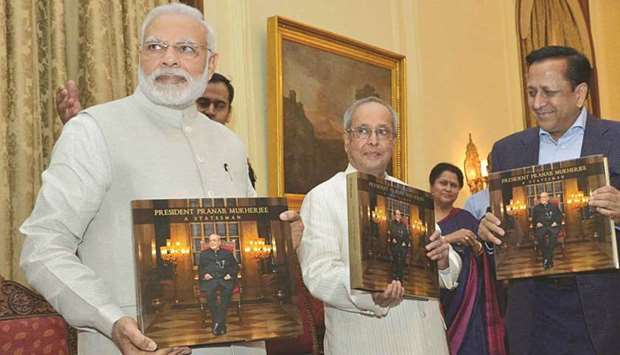Outgoing President Pranab Mukherjee yesterday disclosed that there were some divergences in views between him and Prime Minister Narendra Modi but both kept them to themselves and did not let it affect the government’s functioning.
“We have acted in close co-operation. Surely, there have been divergences of views. But we have been able to keep those divergences to ourselves. It did not affect the relationship between the president and the prime minister,” Mukherjee said on the occasion of the release of a book on his life titled President Pranab Mukherjee – A Statesman at Rashtrapati Bhavan.
The book, a pictorial journey of Mukherjee’s life as the 13th president published by Statesman group, was released by Modi, who presented the first copy to the president.
Looking at Finance Minister Arun Jaitley, who was seated in the front row, Mukherjee said he would often call Jaitley to enquire about certain issues, and the latter would always convince him like “an able and effective advocate”.
“I don’t know how many times I have troubled the finance minister (by) calling him and consulting ‘why this and why not this?’ But he would convince me like an able and effective advocate and I had to concede to his reasoning. The functioning of the government was never disturbed, never stopped and never delayed,” Mukherjee said.
Earlier, the president said he was initially unwilling when the idea of the photo essay was first suggested to him by the publishers. He wondered about the benefit the photo essay would have since the engagements of the president are all in public domain.
However, the president said, he was convinced by the publishers that the president’s life beyond day-to-day events should be documented for posterity.
Later showering lavish praises on the president, Prime Minister Narendra Modi said he – an outsider to Delhi politics before 2014 – settled in the capital in his new role holding on to Mukherjees fingers.
Affectionately calling him ‘Pranabda’, Modi said: “Holding Pranabda’s finger, it got easier for me to settle in Delhi’s day-to-day routine.”
At one point, Modi got emotional while saying that in the last three years, there had never been an occasion, whenever the two met, when Mukherjee did not treat him with “fatherly affection”.
“He (Mukherjee) would often tell me, ‘Modi, you will have to take rest for half of the day. Why are you running around so much, reduce your programmes, take care of your health’,” the prime minister recalled adding that it was the “nice human inside president” that was speaking.
The prime minister said he was “fortunate” to have got the chance to work with Mukherjee.
Commenting on the book which he released, Modi said that moments captured in pictures become historic.
“The world sees the president as flanked by big people, following protocols. But among those protocols, there is also a lively human being... Newspapers often fail to catch the person outside political activity,” Modi observed, adding the newly released book shows the human side of the President in certain candid frames.
Modi also rued that India had never been a “history conscious society” which did not care to preserve things of historic importance.
“There has been a drawback with us... We have never been a history conscious society. Our scholars still have to visit British libraries for research (on our own history),” he said.
Modi said the practice of preserving items and institutions which serve as the chroniclers of history were important in a nation’s life.

Prime Minister Narendra Modi releases a book titled President Pranab Mukherjee u2013 A Statesman at Rashtrapati Bhawan yesterday.
